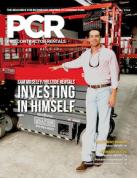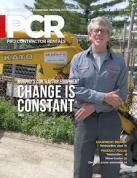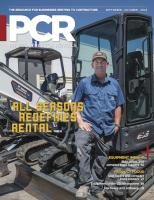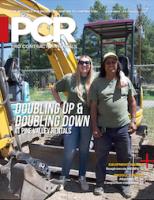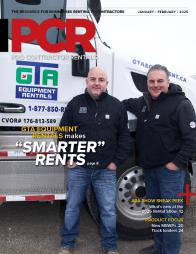Industry Outlook: Trailers
Hauling Iron:
Making loading and transport safer, easier
Considering their precious cargo, having the right trailer is a big step to ensure that your equipment gets to where it needs to be. Manufacturers tell us they’re constantly listening to your needs and working to make improvements that make trailering safer and easier.
For this Industry Outlook, we asked a few manufacturers to provide information on three areas:
- What key features do rental centers look for when choosing trailers?
- Are there any notable changes in design showing how manufacturers are responding to rental center’s needs?
- When it comes to trailer safety and ROI for rental centers, are there key areas of maintenance or use that need ongoing awareness?
Landoll Corporation
Jim Ladner
Sales manager, transportation products division
With the rental industry growing, rental companies have been expanding their transportation fleets. The overall trend we see is that the transportation equipment they are buying is evaluated on quality, life cycle, resale value, maintenance costs and driver retention. Before it was more of a low-price purchase, expected life of seven years, then buy a new unit. Landoll has a long history of manufacturing trailers designed to minimize maintenance costs and stay on the job for many years.
One of the largest challenges to a trailer’s life cycle is the use of deicing chemicals that road crews use to keep highways clear during winter months. Magnesium and calcium chlorides are extremely corrosive to steel – trucks, trailers and rental equipment included.
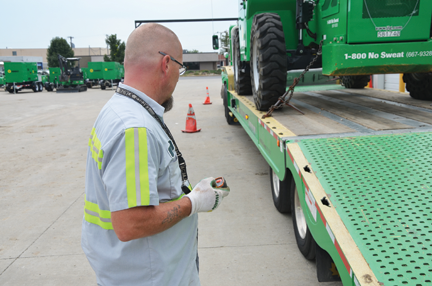 |
| Additional tie-downs and wireless remote control of the trailer are safety features Landoll has included to add value and usability to the trailers you rent to customers. |
Eleven years ago, Landoll designed a trailer frame that could be hot dipped galvanized. Galvanized coating protects steel trailers from rusting and extends the trailer frame’s life for decades. The galvanizing industry has test results running 50 to 100 years, far exceeding the 15 to 20-year life cycle most companies target. Landoll trailer frames are submerged in molten zinc and the trailer design allows the zinc to run in and out of every crossmember, into the corners and overlapped creaks, sealing the entire surface. We have rental company customers who have rewritten their depreciation schedules to life cycles of 12 to 15 years. If you can double the life cycle, ROI increases dramatically.
Trailer designs have changed. Rental companies wanted more useable deck space and scalability, allowing them to maximize the number of pieces of equipment to be moved on a single trip. Landoll introduced the model 900 series trailer over 10 years ago that incorporated the patented traveling axle invented by Don Landoll in 1969. This all-new tail trailer design has a longer wheelbase to allow proper weight distribution between the tractor and trailer. The axles are close to the rear of the trailer and allows equipment to be loaded all the way back on the approach plate. The tail has 24,000 lbs. of lift capacity so it can handle the load.
One of the positive trends Landoll sees is that companies are buying equipment with driver retention in mind, considering driver comfort in the cab and on the trailer. The wireless remote control system on the trailer saves the driver time and steps to get his job done and adds an element of safety when operating the trailer or loading equipment.
Having proper “load securement” is of utmost importance. Roadside inspectors are well versed on
regulations for the type, working load limit and number of tie downs required. When a driver is assigned a load, he may not know what equipment is being hauled or how many pieces of equipment will be hauled. It’s important, then, to make sure they have adequate tie-down points. Landoll has added more double keyhole tie downs on the perimeter frame; we’ve developed a center-mounted tie-down plate that runs the length of the lower deck. Overall, we’ve added about 35 percent more tie down locations to most trailers.
Proper maintenance is vital. Rental centers should consider adding a system to monitor and maintain air pressure, which increases tire life and reduces downtime. It pays for itself quickly.
Convenience to maintenance: It’s important to follow manufacturer’s recommendations for service and maintenance. Landoll supplies a centralized grease system as standard equipment on every trailer. From a single location a service technician can grease the undercarriage rollers, the axles, brakes and slacks. This is a real time saver and, now that a grease job can take minutes, it may be more likely to be done consistently.
Felling Trailers
Patrick Jennissen
Vice president of sales and marketing
There are three key features rental centers ask for – and look for – in trailers: Durability, usability and a focus on safety. Durability consistently receives attention. We design our trailers so they can handle the use and abuse that a rental center is likely to see. With trailers, it’s all about uptime and getting equipment to the job site. When we design our products, we start with the assumption that it’s going to be challenged in a tough, “rental-type” application.
Rental center owners asked us to create models that “do more with less.” Our complete Compact Loader (CL) line of trailers was designed and built on that concept, with the rental market and rental centers in mind. Our CL series of trailers comes equipped to carry a compact loader and multiple attachments – buckets, levelers, forks, auger bits, trenchers and so forth. This is standard and comes in a compact, easily rentable package.
 |
| Direct input from rental customers helped Felling design this trailer to haul any brand of compact loader. |
This recently redesigned trailer is versatile enough to carry any brand of compact loader. So, if your rental center handles Ditch Witch, Bobcat, Toro, or others, you can add this trailer to your fleet without having to order any special attachments or kits. The feedback we’ve received from our rental center customers says it has been “an absolute home run”
for those locations that are renting compact loaders.
From a safety and a longevity standpoint, routine maintenance is an absolute must. We understand that a backhoe or a skid steer are a bigger investment and receive detailed attention when it comes to maintenance. The successful rental center customers that I talk with all have routine trailer maintenance plans. These include daily tire and brake inspections and regular, scheduled maintenance for axle and wheel alignment, critical wear points, checking for overall weld or frame cracking.
Rock Line Products Inc., Airtow Trailers
Travis Townsend
Sales & marketing manager
More than 30 years ago, Al Behr, inventor of the drop-deck trailer and founder of Airtow Trailers, recognized his customers needed a safer way to load and unload light and heavy-duty equipment from a trailer. A history of working within the rental industry, combined with his extensive engineering background, gave Behr the insight needed to design and develop a trailer to meet a rental center’s top three needs: safety, strength and low-maintenance.
Here’s how the company’s trailers meet those needs. First, you can load at ground level. Whether you load low-clearance equipment such as scissor lifts and pavement sweepers by driving on, or load with a hand dolly, you can load quickly, safely and with less labor.
Second, the Airtow deck remains level as it raises and lowers. Equipment won’t shift while loading and
if loading more than one piece, everything remains stable until you are ready to secure for travel. This feature makes for simple, one-man loading and unloading in any weather condition, helping reduce risk.
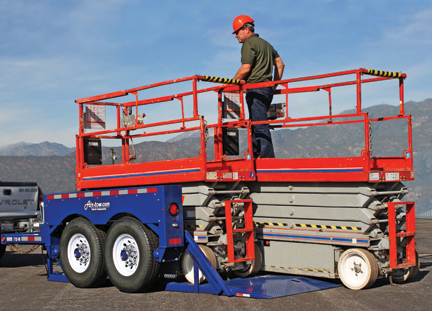 |
| Drop-deck design makes loading scissor lifts an easy task on this Airtow unit. |
Air suspension is another advantage when hauling equipment. The company’s trailers have advance-engineered suspension for a better ride. With more equipment having sensitive electronic components, gentle handling is more important. Airtow provides the only ground-level loading, hydraulic-lift trailer with full air suspension.
Key changes in design and construction have come from responding to customer feedback and from years of experiencing first-hand how trailers perform under the most extreme conditions and uses. For example, the original drop-deck design had a thinner deck plate and, over time, the deck would warp and distort. One of the first upgrades was a 50 percent increase in the thickness of the diamond plate steel deck. Also, the deck’s frame members were moved closer together to ensure stronger deck support. These changes allow the trailer to handle heavier loads.
The frame was redesigned, now providing a 75-in. wide deck while maintaining the legal overall width of 102 in. This is important because many pieces of equipment are 6 ft. wide. Another innovation is the trailer’s suspension. Airtow Trailers are outfitted with “Air-angular,” swing-arm axles connected to long-life, tapered, roller bearings which need virtually no maintenance. Fully-automatic, self-adjusting air suspension that adjusts for the weight being carried and any side-to-side weight differences giving a level ride at all times. Air suspension provides a smoother ride, protecting the load as well as the tow vehicle. This system also helps ensure that all tires carry equal loads, promoting longer tire life.
Because of their ease-of-use, rental centers can package the Airtow Trailer with another equipment rental item, letting the customer – with proper training and knowledge of safe trailering – pick up, use and return rented equipment. Airtow Trailers
carry the National Trailers Manufacturer’s certifications and meet both US and Canadian standards, often required for working with many municipal, government and military agencies. For more information, please visit www.Airtow.com/ProContractor
Towmaster
Shane Zeppelin
Marketing manager
Towmaster’s customers are asking for simplicity. They want a trailer that is easy to own and easy to maintain, yet safe on the road. Our objective is to deliver that trailer to our customers, who demand value and ROI.
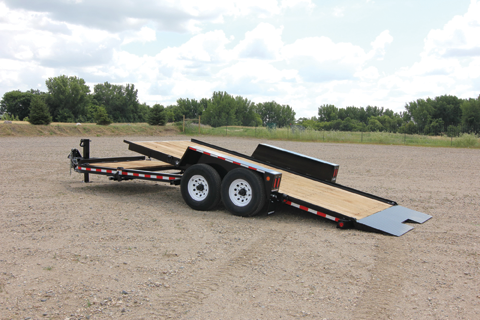 |
| The approach ramp on this Towmaster provides traction and a low-load angle for ease-of-use. |
Over the years, Towmaster has improved our feature set because of the feedback we’ve gotten from our rental customers. Customers have requested trailers with a lower load angle, easier tilt lever and easier lifting ramps. We’ve accommodated these requests by re-engineering specific areas on our trailers.
Rental center managers have seen a lot of trailers and how they wear. When we show them our trailers, they understand that simplicity of use and durability are key traits in our design and manufacturing processes. And safety is always at the forefront of our design. All of these traits translate into ROI for their business.




